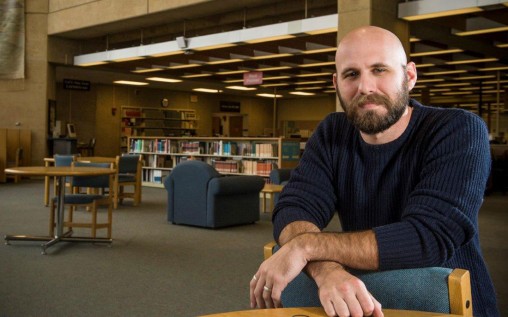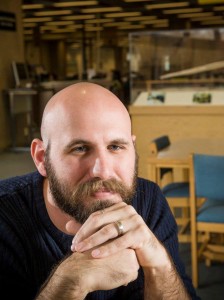
Iraq war veteran Fred Hockney is using the study of philosophy at Wright State to help unlock the mystery of his experience.
Ramadi, Iraq. Explosions, gun battles, death. Thought by some to be the most dangerous place on the planet. U.S. Army soldier Fred Hockney survived it.
Today, Hockney is struggling with that experience and using the study of philosophy at Wright State University to try to unlock the mystery of its meaning.
“There were people dying; it was surreal,” the 28-year-old veteran recalled. “What does it even mean that something is good or is right, and is there a right? I decided that I really wanted to spend time focusing on these big questions.”
Studying philosophy, logic and ethics has given Hockney a lot of time to think.
“You think you’ve figured out something about life, you realize that you might, but that it doesn’t mean anything,” he said. “I feel like philosophy really needs to have some sort of practical application.”
Hockney grew up in Union, Ky., south of Cincinnati, the son of a database programmer and a schoolteacher. He aspired to be a veterinarian and after graduating from Ryle High School in 2005 began studying forensics chemistry at Northern Kentucky University on full scholarship.
But he got bored and dropped out in the middle of the semester, bent on spreading his wings. Without telling his parents, the 19-year-old went to the Marine recruiting office in Florence, Ky., one day to enlist. But the office was closed, so he walked next door and signed up for the Army.
“I go home, my family is eating Thanksgiving dinner, and I said, ‘Oh, by the way, I joined the Army,’” he said. “There was a huge fight. They were distraught.”
Because his Army test scores were so high, Hockney was advised to pick a specialty like linguistics or engineering or computers. He selected combat arms.

After graduating from Wright State this spring, Fred Hockney plans to pursue a Ph.D. so he can become a professor of philosophy.
“I said, ‘I want to do something where I can blow stuff up and be in the field,’” he said. “I didn’t want to be stuck behind a desk.”
Hockney shipped out to Fort Benning, Ga., on Dec. 28, 2005, and went through an infantry boot camp under a Special Forces instructor.
“The training stuck with me my entire life,” he said. “I realized I could do so much more than I thought I could do. There is a science to everything. There is a science to running. There is a science to shooting. There is a science to staying sane in insane situations. It taught me a lot about myself, about life.”
Hockney deployed to Ramadi in 2007 with an infantry unit. Trained as a forward observer, he would direct artillery fire on enemy positions. During his 15-month tour, he was also assigned to a tank company, a Humvee unit and then a team that trained members of the Iraqi Army, where he made use of his Iraqi Arabic.
Hockney returned home in 2008 and resumed classes at Northern Kentucky, majoring in English and then journalism. He joined the school newspaper, became the news editor and interned at the Fort Knox Leader, a newspaper for ROTC students. Then he got interested in sculpture and began pursuing a fine-arts degree.
“This whole time I’m dealing with my overseas experience and trying to integrate back into civilian life and being completely lost,” he said. “I didn’t know what life was about. So I’m trying all of these different things.”
In 2012, he moved to Fort Wayne, Ind., and began studying metalsmithing — crafting works of art out of metal — at Indiana University-Purdue University Fort Wayne. During that time he took a peace studies course, which he found cathartic.
“I realized that’s really where I wanted to be,” he said. “It was a very intellectual, ivory-tower sort of place where I could really mull over applying what I’d learned in the military and the ways I’d learned about thinking in fine arts and the writing I’d learned in English to something I felt like helped the world.”
In 2013, he transferred to Wright State and began pursuing his bachelor’s degree in philosophy and started taking Greek as his foreign language.
“I decided that if I wanted to do philosophy, I wanted to read the greats — Plato and Aristotle — in the original Greek,” he said. “If I learned one thing, it’s that words mean something different in a different language. You can translate them, but they don’t have the same force.”
Hockney revels in his Scottish heritage and plays the bagpipes to relax. He has been seen on campus wearing a kilt, even in the coldest of weather.
He is scheduled to graduate in the spring and has applied to eight philosophy Ph.D. programs. His goal is to become a professor of philosophy.
“Unanimously agreeing that Fred is one of their most talented students in recent memory, the Philosophy Department faculty selected him as the program’s outstanding graduating senior for 2015,” said Ava Chamberlain, professor and chair of the Departments of Religion, Philosophy, and Classics.
Hockney says Wright State is special because the faculty is so accessible and supportive of the students.
“And the campus is beautiful,” he said. “This has by far been the best campus I’ve been on in terms of accessibility and quality of the buildings. I love the tunnels.”
Wright State is engaged in a $150 million fundraising campaign that promises to further elevate the school’s prominence by expanding scholarships, attracting more top-flight faculty and supporting construction of state-of-the-art facilities. Led by Academy Award-winning actor Tom Hanks and Amanda Wright Lane, great grandniece of university namesakes Wilbur and Orville Wright, the campaign has raised more than $110 million so far.

 Wright State grad Hannah Beachler earns Oscar nomination for production design on ‘Sinners’
Wright State grad Hannah Beachler earns Oscar nomination for production design on ‘Sinners’  Wright State alum Emily Romigh builds on a family legacy in education
Wright State alum Emily Romigh builds on a family legacy in education  Wright State receives $3 million grant to strengthen civic literacy and engagement across Southwest Ohio
Wright State receives $3 million grant to strengthen civic literacy and engagement across Southwest Ohio  Fitness Center renovation brings new equipment and excitement to Wright State’s Campus Recreation
Fitness Center renovation brings new equipment and excitement to Wright State’s Campus Recreation  Wright State University settles civil lawsuit against WSARC, now doing business as Parallax Advanced Research Corporation
Wright State University settles civil lawsuit against WSARC, now doing business as Parallax Advanced Research Corporation 